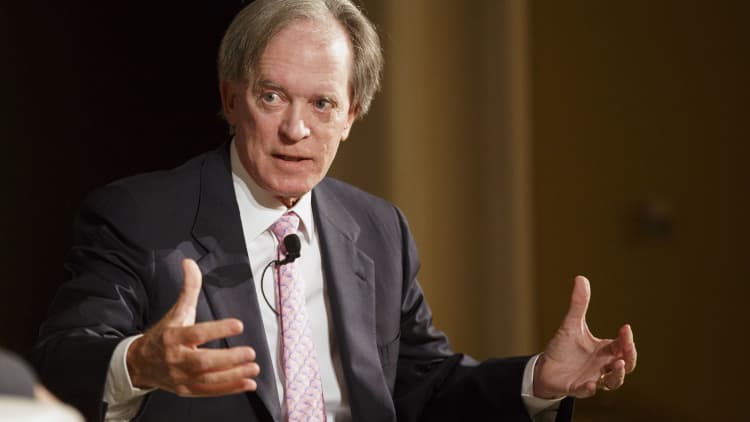
Stocks looked primed to run on Friday morning. But that didn't happen.
Following a morning rally before Donald Trump's inauguration, stocks waffled after the new president gave an inaugural speech that was heavy on rhetoric but lacked details on his much-hoped-for, pro-growth policies.
"The only reason we were up before was the optimism ahead of the inauguration," said Peter Boockvar, chief market analyst with Lindsey Group.
Boockvar said Trump's tone was not a surprise to him, but perhaps Wall Street was looking for a new tone.
"He sounded protectionist and 'America first' … Everybody knows that's part of this … This is not a state of the union where people are going to get policy-type discussions. A speech like this is supposed to sound broad. I don't think there should have been any expectation of specifics," he said.
"But he did emphasize America first, American jobs, and that's not a free trade mentality, and it sounds protectionist. We knew that was his attitude," Boockvar said.
By far the number one issue on the global economy in the next year is how far down the path of trade tensions do we go here, and mixed into those is also geopolitical tensions as well.Ethan Harrishead of global economics, Bank of America Merrill Lynch
One trader described the speech as sounding more like a campaign speech, when the market was hoping for details or at least encouragement that tax policy would be at the top of his agenda. Trump did speak about putting America first when it comes to trade, returning jobs to America, rebuilding the military and turning the government over to the American people.
He also used the word "protection," saying it will lead to prosperity and strength.
"He didn't decide to go high. He decided to go populist and protectionist, and that's something we're going to have to get used to. When you put together populism and protectionism, it has a lot of economic fallout. That's how he got here," said Wunderlich Securities strategist Art Hogan. "He's going to continue to ride that train. Let's see what happens when he meets up with the harsh reality of what it takes to get things done in Washington. I think we can get back to focusing on earnings next week.
Protectionism on trade has been a source of concern about Trump, and there are worries he will spark a global trade war. Economists say that is one issue that could hurt U.S. growth, even as his other policies would encourage growth.
"By far the number one issue on the global economy in the next year is how far down the path of trade tensions do we go here, and mixed into those is also geopolitical tensions as well. So do we have a gradual process, where there's some concession on all sides and things will move smoothly, or do things get very heated and people start to worry about serious back-and-forth tariffs?" said Ethan Harris, head of global economics at Bank of America Merrill Lynch.
Should we still trade 17-18 times earnings now that we have a potentially protectionist president, and we have rising rates? The Fed is raising rates. This is a different moment now, and we're not sure what we're going to get. We had a powerful rally that priced in a lot of optimism.Peter Boockvarchief market analyst, Lindsey Group
Hogan said the market will now turn its attention to what Trump will do immediately through executive order.
"If you were geared up to buy the election and sell the inauguration, you're disappointed. Now we start to focus on what the first 100 days look like," said Hogan.
The inaugural speech had been built up by some traders as a possible pivot point for the market. There was a view that the inaugural address would be an event that could prompt selling, but the reaction was relatively muted. The question is whether Trump, as president, can reignite market rally going by taking swift action.
Stocks were higher ahead of the noon swearing in of President Trump. The Dow was up about 100 points, just as he started speaking. During the speech, the Dow cut its gains in half, waffled a bit, and then recovered much of its losses.
"I keep wondering what the multiple should be. Should we still trade 17-18 times earnings now that we have a potentially protectionist president, and we have rising rates? The Fed is raising rates. This is a different moment now, and we're not sure what we're going to get. We had a powerful rally that priced in a lot of optimism," Boockvar said.
BlackRock chief equity strategist Kate Moore said she thought the president's message was downbeat on the U.S. economy, which is doing much better than portrayed with corporate profits recovering and near full employment.
"It was not perhaps the most optimistic presidential speech I've heard," she said. "I think the real key is how Trump and his cabinet pivot to be truly forward looking instead of just criticizing what has and hasn't happened, and perceived weakness in the U.S. economy. The market is not responding one way or the other. It's very much in wait and see mode." She said Trump did send the markets an important message earlier in the week he said in an interview that he thought he dollar was too strong.
Boockvar said the market will now look for more action from the White House on things like deregulation, tax reform, and stimulus spending to support the gains stocks have made.
"I think we're back in this chop-fest that we've been in since December. Now that he's president, people want to see details. They want to see details of tax policies. The rhetoric now has to turn into realty. It all begins now," Boockvar said. "This is the same market we've had for six weeks now. The trump rally essentially ended in the middle of December."


